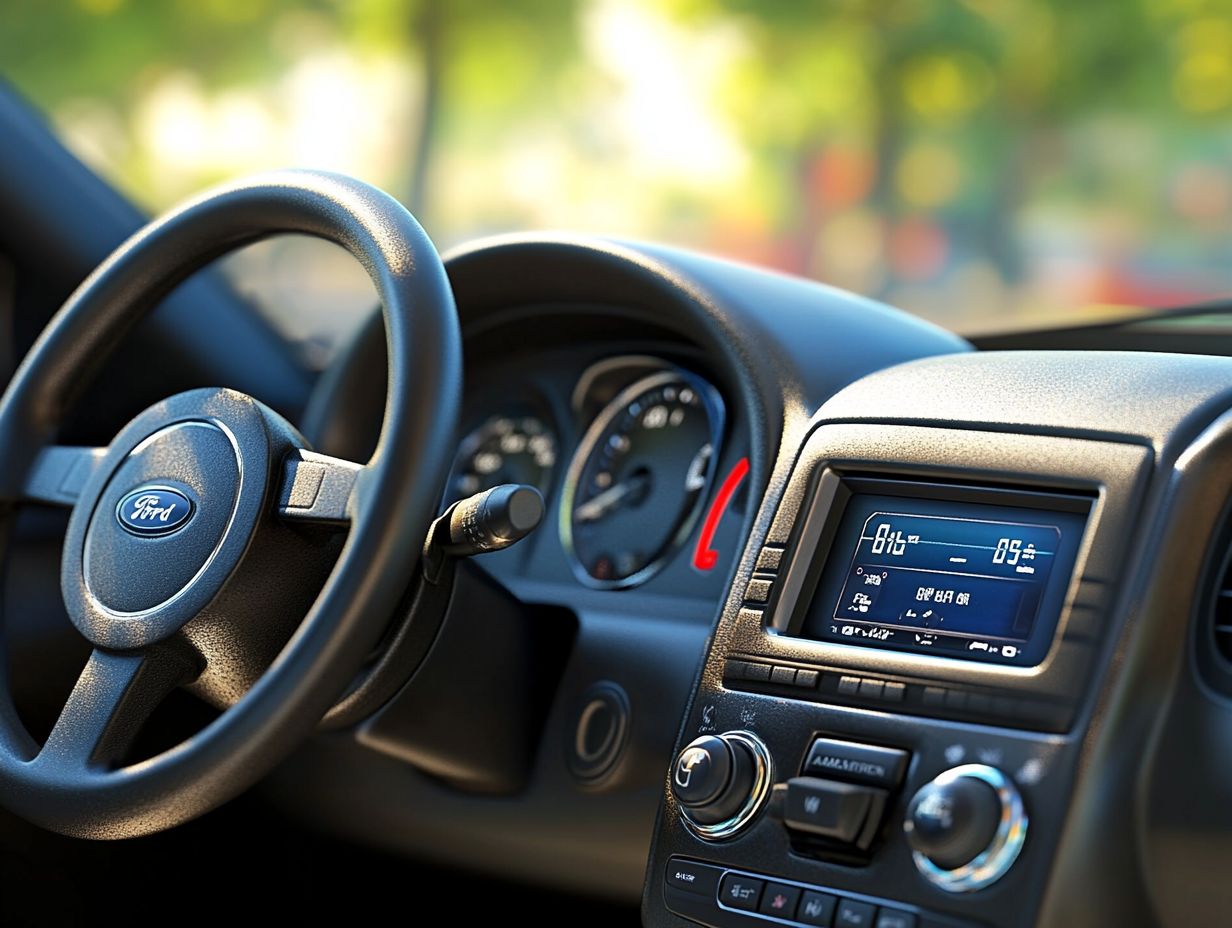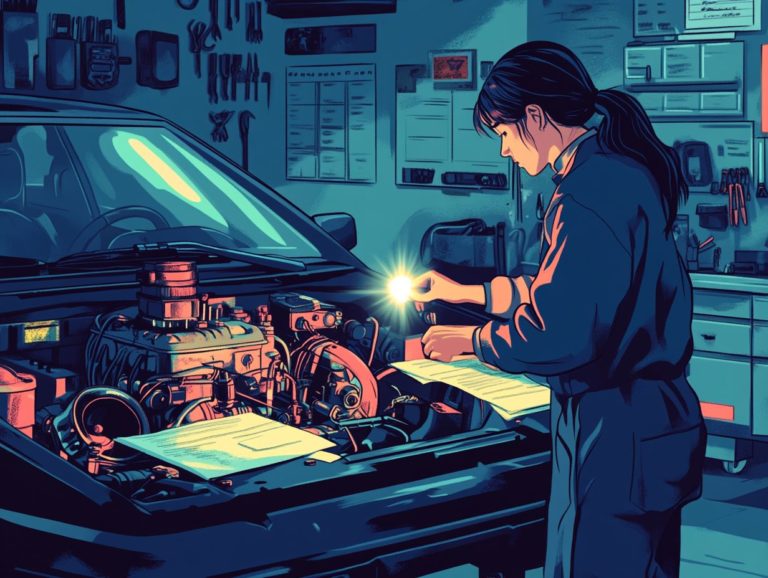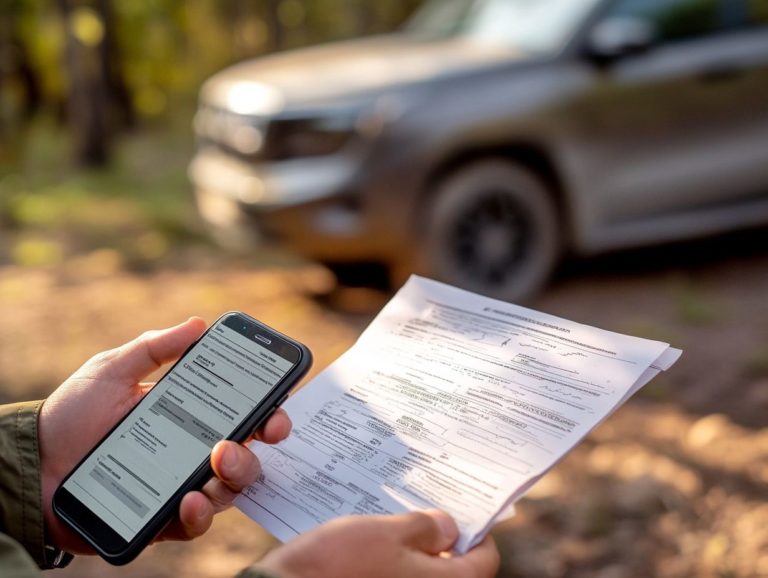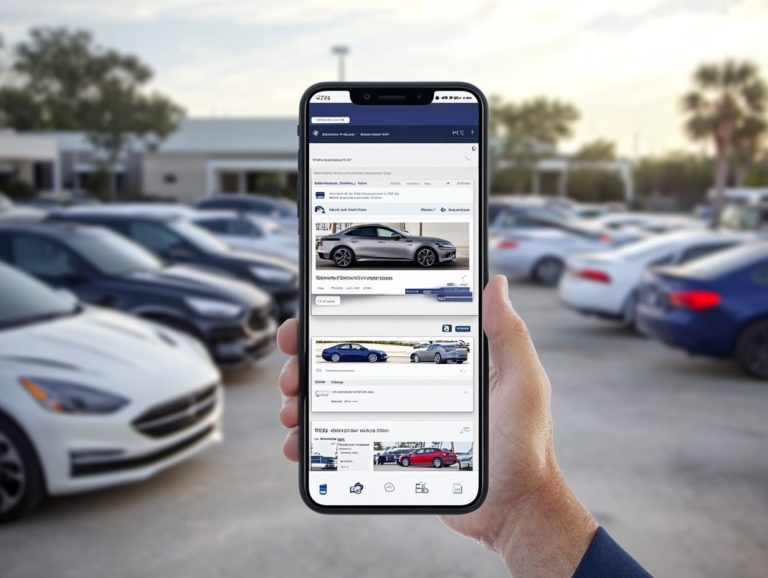5 Essential Features in a Used Car
Buying a used car can be both thrilling and a bit overwhelming. With many options at your fingertips, knowing what to prioritize is crucial for making a smart investment.
Five key features can greatly influence your decision:
- Low mileage
- Excellent condition
- A reputable brand
- A reasonable price
- Impressive fuel efficiency
This article answers common queries regarding how to assess a car s condition, grasp pricing structures, and evaluate fuel efficiency. By the end, you ll be equipped with the confidence to find the ideal used car that perfectly aligns with your needs and budget.
Contents
- Key Takeaways:
- 1. Low Mileage
- 2. Good Condition
- 3. Reliable Brand
- 4. Affordable Price
- 5. Good Fuel Efficiency
- What to Look for When Buying a Used Car?
- Frequently Asked Questions
- What are the 5 essential features to look for in a used car?
- What safety features should I look for in a used car?
- How important is the reliability of a used car?
- Why is fuel efficiency important in a used car?
- Is it important to check the maintenance history of a used car?
- Why is it important to check the maintenance history of a used car?
- What technology features should I look for in a used car?
- Why is reliability crucial when buying a used car?
- Why is fuel efficiency important in a used car?
Key Takeaways:
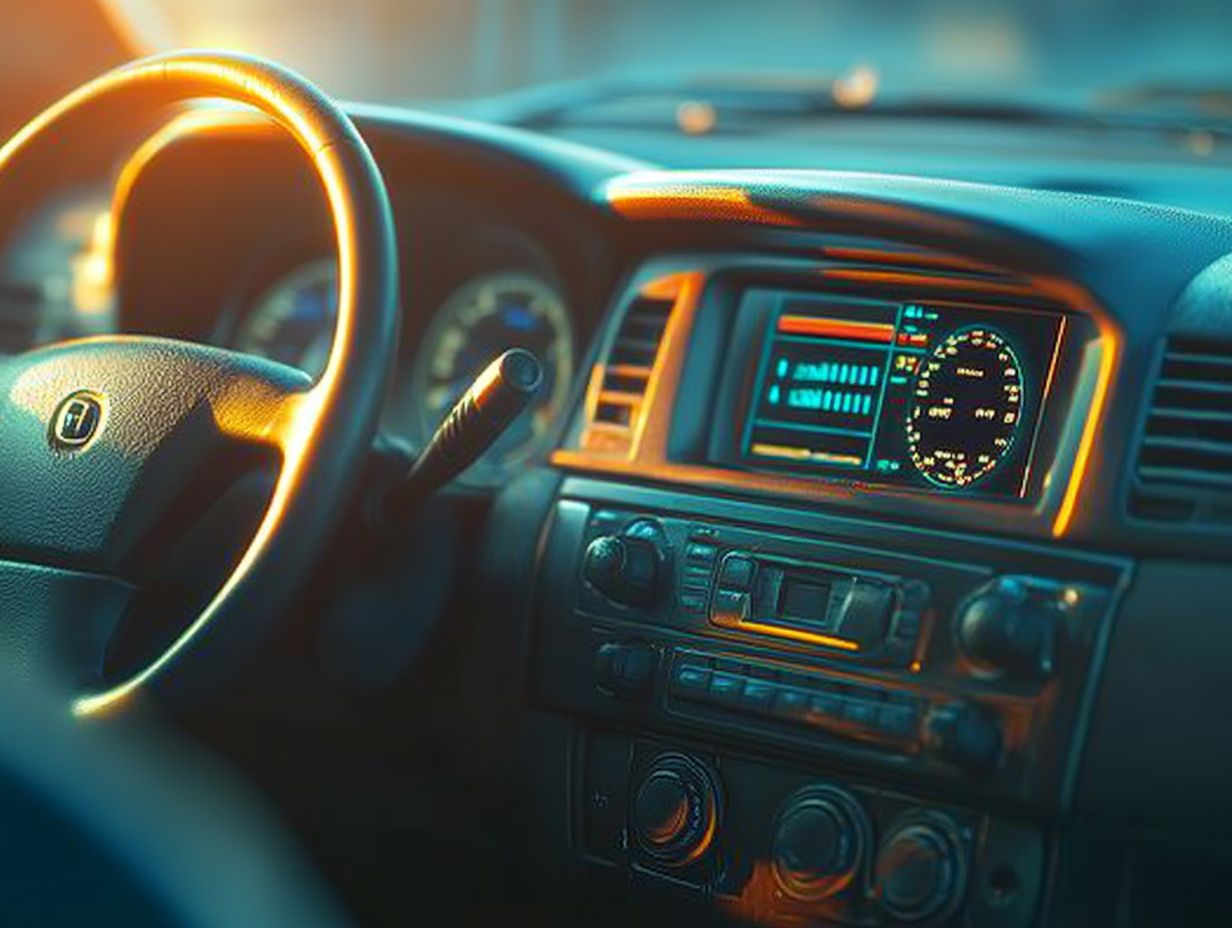
- Low Mileage: Indicates less wear and tear on the vehicle.
- Good Condition: Avoid costly repairs by ensuring the car is well maintained.
- Reliable Brand: Peace of mind with trusted manufacturers.
1. Low Mileage
When you re in the market for a used car, low mileage is often a vital sign of the vehicle’s overall health and longevity. This factor is important if you re seeking reliability and performance.
A car with lower mileage usually means there s been less wear and tear on its components, suggesting it could offer a longer lifespan and better efficiency.
This reduced strain often translates to more dependable performance over the years. Cars with lower mileage usually hold their resale value better, making them a smart investment for future ownership.
Make sure the mileage is accurate by using vehicle history reports and scheduling a thorough inspection. These steps will help you verify the odometer reading and uncover any potential discrepancies, further protecting your investment.
2. Good Condition
Assessing a used car’s condition is vital to ensure it aligns with your expectations and requirements, especially regarding the interior, exterior, and safety features that increase the value of new cars.
Begin with a thorough examination of the interior. Look for signs of wear and tear, such as frayed upholstery, stained carpets, or malfunctioning electronics. Pay particular attention to the dashboard and controls to verify that everything operates as it should.
Next, shift your focus to the exterior. Search for signs of damage, such as scratches, dents, or rust, which could hint at more serious underlying issues. It’s essential to ensure that all safety features are functioning properly. For a thorough assessment, consider the 5 key aspects of a comprehensive car review. Test the airbags, anti-lock brakes (which help prevent wheels from locking during sudden stops), and seatbelts to guarantee a safe and secure driving experience.
3. Reliable Brand
Choosing a reliable brand when purchasing a used car profoundly influences your ownership experience. Established manufacturers often boast stronger performance records and better vehicle histories.
A brand’s reputation is typically built on durability, customer feedback, and the availability of dependable service. Weigh these factors carefully.
Brands like Toyota, Honda, and Subaru often receive accolades for their longevity and minimal maintenance costs, setting a benchmark in the industry.
Vehicle history reports are invaluable tools in your decision-making process, showing past accidents and ownership details. With this information at your fingertips, you can make informed choices, ensuring you select a vehicle that aligns perfectly with your needs and expectations for reliability.
4. Affordable Price
Finding an affordable price for a used car demands diligent research and a solid grasp of the trade-in process. This ensures you secure the best deal without falling into the trap of overpaying.
To navigate this landscape, assess comparable prices within your local market by examining listings and sales for similar models. This knowledge equips you to make informed decisions that could save you significant money.
Mastering effective negotiation techniques can dramatically influence the final price. Being prepared to walk away or negotiate add-ons gives you the upper hand in discussions, allowing you to advocate for yourself confidently.
Exploring trade-in options is a savvy strategy to trim overall expenses. By evaluating the value of your current vehicle, you can potentially unlock a substantial discount on your new purchase, creating a win-win scenario while keeping your budget intact.
Now that you know what to look for, start exploring your options today!
5. Good Fuel Efficiency
Good fuel efficiency is vital when evaluating used cars. It directly influences your cost of ownership and the vehicle’s performance.
When assessing a car’s fuel economy, look beyond just the miles per gallon (MPG) ratings. Consider your driving habits, the terrain, and the maintenance history these can significantly affect fuel consumption.
Mileage is also key as it reflects the vehicle’s overall wear and tear. Hybrids and compact cars, like those from Toyota and Honda, are typically top contenders for fuel efficiency.
Don t forget to check tire pressure, engine condition, and the weight you carry. These factors can impact fuel efficiency, so evaluate them carefully.
What to Look for When Buying a Used Car?

When shopping for a used car, consider several key factors, including essential tools for used car buyers, to ensure your purchase meets your expectations.
Examine the vehicle’s history and safety features. Checking vehicle history reports can reveal past accidents or service records that affect the car’s longevity.
Thorough inspections help you assess the vehicle’s condition and spot signs of wear and tear.
Evaluate the reliability of safety features, like rearview cameras, which enhance visibility and reduce accident risks. Ensure the in-car entertainment and navigation system has modern connectivity options, such as Apple CarPlay and Android Auto.
What Are the Most Reliable Car Brands?
Identifying reliable car brands is crucial for used car buyers. Certain manufacturers consistently perform better over time.
Brands like Toyota and Honda often top reliability charts, boasting customer satisfaction ratings above 90%.
These statistics reflect consumer confidence in the longevity and performance of their vehicles. A brand s reputation, formed through years of reliable service, influences your purchase decisions and satisfaction.
Choosing these reputable brands often means fewer repairs and greater peace of mind.
How to Determine the Condition of a Used Car?
Determining a used car’s condition involves a thorough evaluation. It’s essential to inspect both the interior and exterior for quality, and knowing the signs of a good used car deal can help in this process.
- Check the exterior for scratches, dents, or rust, which may indicate past accidents.
- Examine the tires; they should be evenly worn and properly inflated.
For the interior, inspect upholstery for stains and signs of wear. Ensure that all electronics work, as broken features can lead to expensive repairs.
Look under the hood for fluid leaks and assess the condition of belts and hoses. While a thorough inspection reveals many issues, a professional inspection can uncover hidden problems. This deeper understanding helps you make informed decisions.
What Is a Reasonable Price for a Used Car?
Understanding what constitutes a reasonable price for a used car requires a careful look at various factors, including market trends, vehicle condition, and the nuances of the trade-in process to secure a fair deal.
To navigate this landscape effectively, start by researching local and online platforms that list comparable vehicles. This allows you to conduct a thorough comparison of prices from different dealerships.
Evaluating the mileage, features, and overall condition of similar models can provide invaluable insights into realistic pricing.
Using helpful tips, such as knowing the market value in advance and being aware of seasonal demand fluctuations, can significantly bolster your negotiating power.
This level of preparation instills confidence in your discussions with sales representatives and aids in distinguishing genuine price reductions from inflated figures, ultimately steering you towards a more favorable purchase outcome.
How to Calculate Fuel Efficiency for a Used Car?
Calculating fuel efficiency for a used car is crucial when assessing its cost-effectiveness. You’ll need a solid grasp of mileage and performance metrics to make an informed decision.
Start by using the formula: miles driven divided by gallons of fuel used. This provides a straightforward way to quantify how efficiently the vehicle operates. Gather the necessary data by tracking both the distance traveled and the fuel consumed over a specific period. Ensure the odometer is functioning correctly and log your fuel purchases accurately.
Keep in mind that various factors can influence fuel efficiency. Maintaining records such as regular oil changes and tire alignments plays a crucial role in optimal performance. A little diligence in this area can lead to remarkable improvements in fuel consumption.
What Are the Benefits of Buying a Used Car?
The benefits of buying a used car are plentiful, especially when you consider affordability, lower depreciation rates, and often superior performance and safety features compared to new models. To maximize your savings, check out these 5 ways to save money on a used car purchase.
By opting for a pre-owned vehicle, you can significantly reduce your upfront costs and monthly payments. This allows you to direct your budget toward enhanced features or accessories that elevate your driving experience.
Don t miss out on the chance to save money! Used cars tend to depreciate at a slower pace, helping you preserve their value over time. With the availability of higher-tier models at a more accessible price, you can indulge in luxurious features and advanced technology that might have felt out of reach when eyeing new vehicles.
Many current used vehicles come outfitted with modern safety innovations, superior fuel efficiency, and impressive performance capabilities. This makes them a savvy choice for anyone looking to strike the perfect balance between quality and cost-effectiveness.
Frequently Asked Questions
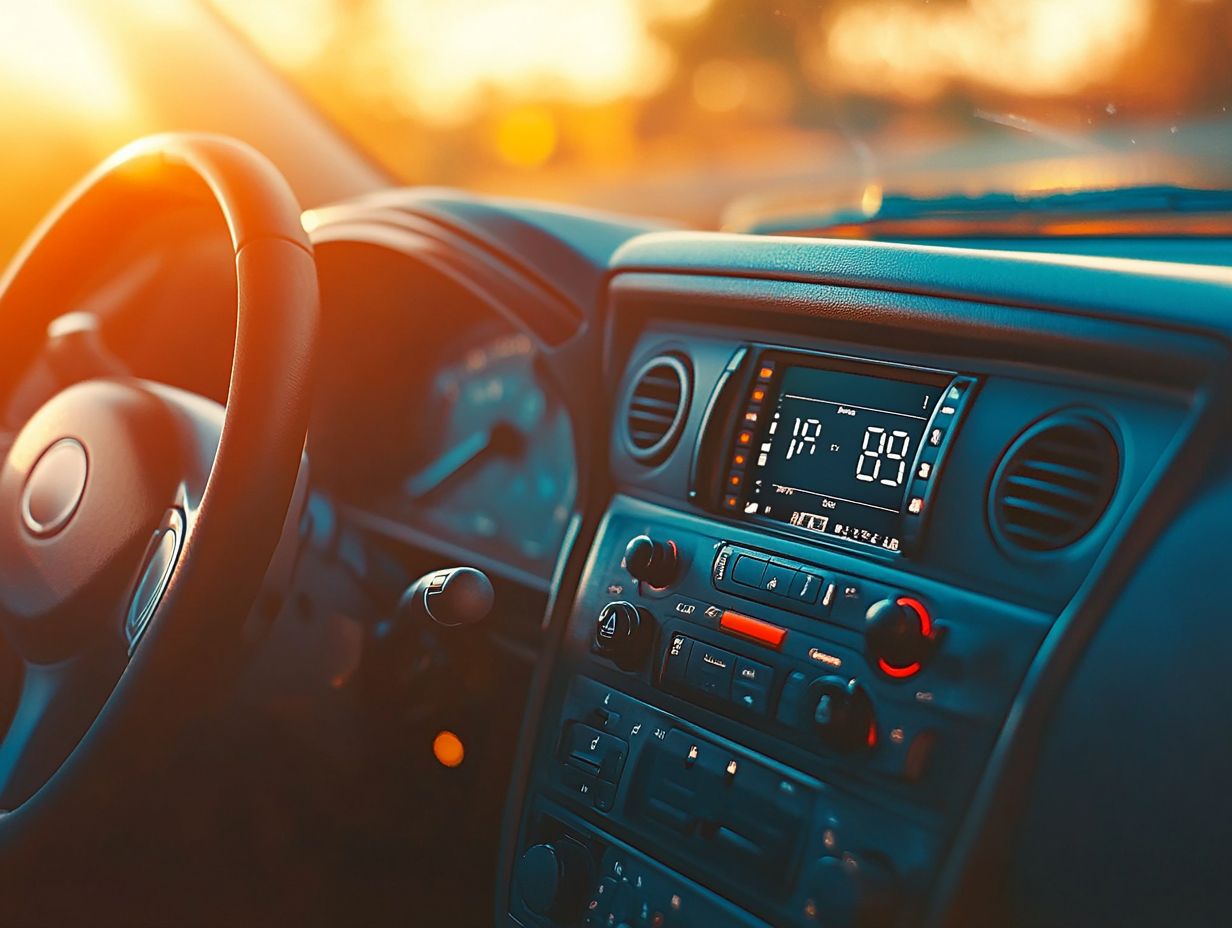
What are the 5 essential features to look for in a used car?
The 5 essential features to look for in a new car are safety, reliability, fuel efficiency, maintenance history, and technology. These features ensure that you are getting a quality used car that meets your needs.
What safety features should I look for in a used car?
When shopping for a used car, make sure to look for features such as airbags, anti-lock braking system (ABS), electronic stability control (ESC), and blind spot monitoring. Additionally, be aware of 5 red flags when buying a used car to help keep you and your passengers safe on the road.
How important is the reliability of a used car?
Reliability is crucial when buying a used car because it determines the longevity and performance of the vehicle. Additionally, consider the 5 things every new car buyer should know to ensure you are getting a dependable car with a good track record for reliability.
Why is fuel efficiency important in a used car?
Fuel efficiency is important in a used car because it can save you money on gas in the long run. Cars with good fuel efficiency will also have a lower impact on the environment and reduce your carbon footprint.
Is it important to check the maintenance history of a used car?
Checking the maintenance history of a used car is vital. It helps you understand how well the vehicle has been cared for and can alert you to potential issues that may arise in the future.
Why is it important to check the maintenance history of a used car?
Check the maintenance history of a used car. This insight reveals how well the car has been cared for and highlights any major repairs.
This step helps you steer clear of potential future issues.
What technology features should I look for in a used car?
Look for features like a backup camera, Bluetooth, and a navigation system. These enhance your driving experience and make daily commutes easier.
Why is reliability crucial when buying a used car?
Reliability determines how long and well your vehicle performs. Choose cars known for their dependability.
Why is fuel efficiency important in a used car?
Fuel efficiency saves you money on gas over time. Plus, it reduces your environmental impact.
